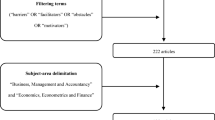Abstract
This article examines how and why the role of the university in society has evolved over time. The paper argues that the forces shaping economic growth and performance have also influenced the corresponding role for the university. As the economy has evolved from being driven by physical capital to knowledge, and then again to being driven by entrepreneurship, the role of the university has also evolved over time. While the entrepreneurial university was a response to generate technology transfer and knowledge-based startups, the role of the university in the entrepreneurial society has broadened to focus on enhancing entrepreneurship capital and facilitating behavior to prosper in an entrepreneurial society.

Similar content being viewed by others
Notes
Stephen Budiansky, “Brand U.,” New York Times, April 26, 2006, p. A23.
Steve Lohr, “U.S. Research Funds Often Lead to Start-Ups, Study Says,” New York Times, April 10, 2006.
Quoted from Steve Lohr, “U.S. Research Funds Often Lead to Start-Ups, Study Says,” New York Times, April 10, 2006.
Halberstam (1993, p. 118) points out that what Wilson actually said was somewhat different, “We at General Motors have always felt that what was good for the country was good for General Motors as well.”
Introductory statement of Birch Bayh, September 13, 1978, cited from the Association of University Technology Managers Report (AUTM) (2004, p. 5).
Statement by Birch Bayh, April 13, 1980, on the approval of S. 414 (Bayh-Dole) by the U.S. Senate on a 91-4.
Public Law 98–620.
“Innovation’s Golden Goose,” The Economist, 12 December, 2002.
Cited in Mowery (2005, p. 64).
References
Acs, Z., Audretsch, D. B., Braunerhjelm, P., & Carlsson, B. (2010). The missing link: The knowledge filter and entrepreneurship in endogenous growth. Small Business Economic, 34(2), 105–125.
Aldridge, T. T., & Audretsch, D. B. (2011). The Bayh-Dole act and scientist entrepreneurship. Research Policy, 40(8), 1058–1067.
Association of University Technology Managers (2004). Recollections: Celebrating the history of AUTUM and the Legacy of Bayh-Dole.
Audretsch, D. B. (2007). The entrepreneurial society. New York: Oxford University Press.
Audretsch, D. B. (2009). The entrepreneurial society. Journal of Technology Transfer, 3(June), 245–254.
Audretsch, D. B., Keilbach, Max., & Lehmann, Erik. (2006). Entrepreneurship and economic growth. Oxford: Oxford University Press.
Bush, V. (1945). Science: The endless frontier. Washington, D.C: Government Printing Office.
Kenney, M., & Patton, D. (2009). Reconsidering the Bayh-Dole act and the current university invention ownership model. Research Policy, 38(9), 1407–1422.
Link, A. N., & Siegel, D. S. (2005). University-based technology initiatives: Quantitative and qualitative evidence. Research Policy, 34(3), 253–257.
Link, A. N., Siegel, D. S., & Bozeman, B. (2007). An empirical analysis of the propensity of academics to engage in informal university technology transfer. Industrial and Corporate Change, 16(4), 641–655.
Lockett, D. S., Wright, M., & Ensley, M. (2005). The creation of spin-off firms at public research institutions: Managerial and policy implications. Research Policy, 34(7), 981–993.
Lockett, A., Wright, M., & Franklin, S. (2003). Technology transfer and universities’ spin-out strategies. Small Business Economics, 20(2), 185–201.
Lucas, R. (1988). On the mechanics of economic development. Journal of Monetary Economics, 22, 3–39.
Mowery, D. C. (2005). The Bayh-Dole act and high-technology entrepreneurship in U.S. Universities: Chicken, egg, or something else? In G. Liebcap (Ed.), University entrepreneurship and technology transfers (pp. 38–68). Amsterdam: Elsevier.
Nelson, R. R. (1981). Research on productivity growth and productivity differences: Dead ends and new departures. Journal of Economic Literature, 19(3), 1029–1064.
O’Shea, R. P., Chugh, H., & Allen, T. J. (2008). Determinants and consequences of university spinoff activity: A conceptual framework. Journal of Technology Transfer, 33, 653–666.
Phan, P., Siegel, D., & Wright, M. (2005). Science parks and incubators: Observations, synthesis and future research. Journal of Business Venturing, 20(2), 165–182.
Romer, P. (1986). Increasing returns and long-run growth. Journal of Political Economy, 94(5), 1002–1037.
Shapiro, H. (2005). A larger sense of purpose: Higher education and society. Princeton: Princeton University Press.
Siegel, D. S., Veugelers, R., & Wright, M. (2007). Technology transfer offices and commercialization of university intellectual property: Performance and policy implications. Oxford Review of Economic Policy, 23(4), 640–660.
Solow, R. (1956). A contribution to the theory of economic growth. Quarterly Journal of Economics, 70, 65–94.
Author information
Authors and Affiliations
Corresponding author
Rights and permissions
About this article
Cite this article
Audretsch, D.B. From the entrepreneurial university to the university for the entrepreneurial society. J Technol Transf 39, 313–321 (2014). https://doi.org/10.1007/s10961-012-9288-1
Published:
Issue Date:
DOI: https://doi.org/10.1007/s10961-012-9288-1




